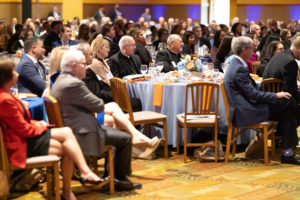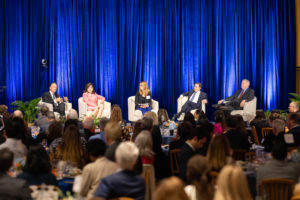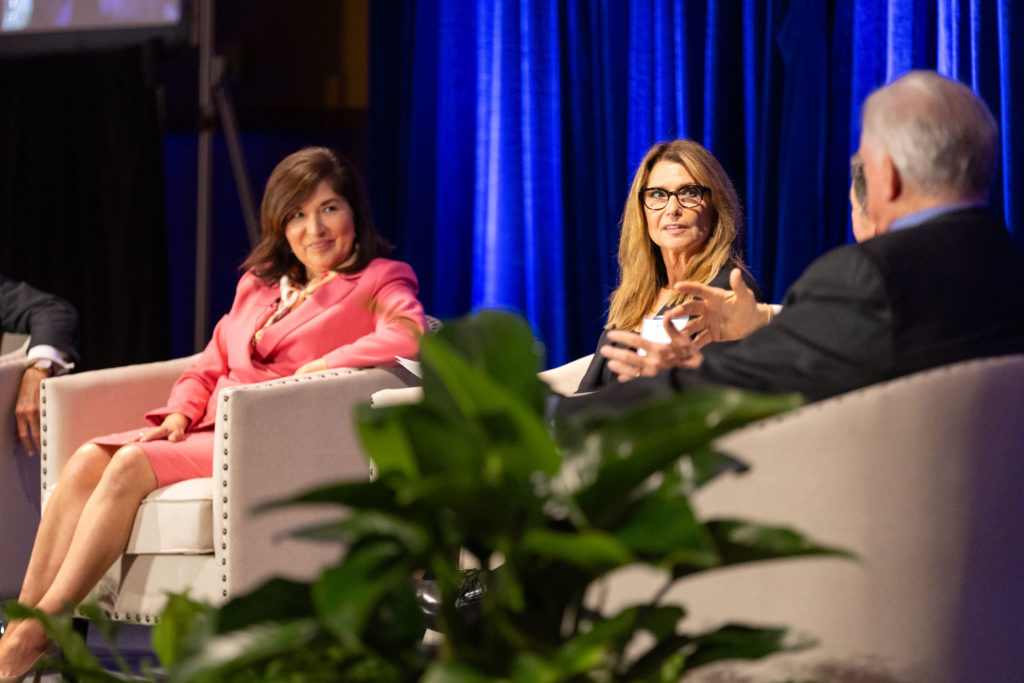Panelists at LA’s inaugural Ethical Leadership Lunch praised Catholic education’s role in forming ethical leaders and discussed what “doing the right thing” means in a time when businesses face pressure to take positions on current events.
Held at the Cathedral of Our Lady of the Angels’ conference center, the May 17 event was hosted by the Archdiocese of Los Angeles and drew more than 500 people, among them local entrepreneurs and executives, ministry leaders, Catholic educators, and high school students.
Archbishop José H. Gomez and Father Jim Anguiano, vicar general and moderator of the Curia for the archdiocese, began with a prayer and greeting before a video message from event sponsor Farmers & Merchants Bank was shown.
Later, former CNN anchor Carol Costello moderated a panel with four local Catholic business leaders about what ethical leadership looks like in “a world where unethical behavior is rewarded or ignored for seemingly the greater good.”
“Somebody’s gonna put pressure on you to change your decisions because it’s good business sometimes,” said Costello, a Catholic who teaches journalism at Loyola Marymount University and is married to the university’s president, Timothy Law Snyder.

The panelists agreed that faith-based values passed on during childhood — especially in the family and at Catholic school — provided the necessary foundation for ethical business leadership.
“Especially today, with so much noise, our Catholic schools are there to reinforce the faith-based growth that happens at home,” said President & CEO of the Los Angeles Area Chamber of Commerce Maria S. Salinas. “I think we need to embrace that.”
In a nod to the event’s Catholic audience, former LA Dodgers executive Bob Graziano, now vice chairman for J.P. Morgan’s Western Region, said he didn’t think “it’s difficult to be an ethical leader … because it’s part of the DNA of most people in this room to be ethical and to be leaders.”
“You don’t become an ethical leader overnight,” added Graziano later. “You’re inspired by others who are ethical leaders.”
Like Graziano, real estate mogul and former LA mayoral candidate Rick Caruso was quick to dismiss Costello’s concerns about the challenges in today’s society of balancing one’s moral beliefs with running a successful business.
“I don’t think it’s that hard,” said Caruso. “Good leaders, it’s not hard.”
Costello also asked the panel about the public expectations business leaders face to “take a stand” on current events, especially from younger consumers.
“I don’t think business leaders, corporate executives should feel the need to take a position on everything that’s going on,” said Caruso. “If you’re running a public company, your duty is to your employees and your shareholders, and you may not want to be issuing an opinion on something. So I think it has to be depending on the facts and the circumstances.”
Salinas recalled weighing how to respond to the George Floyd protests in 2020 during a time of national unrest while waiting for facts to emerge about Floyd’s death. Her organization eventually issued a statement four days after Floyd’s death.
“I felt that that was the right thing to do … knowing that it’s not possible to please everyone,” said the Loyola Marymount alumnus.
In another question, Costello read the speakers two passages from a 2023 book-length interview with Pope Francis discussing economic justice and asked how they would help the pontiff realize his call for “distributive” production of wealth in a capitalist economy. Philanthropy, panelists responded, is a more effective means to spread wealth than what Graziano called “socialistic” government measures such as wealth taxes.
“It’s really about the people who are wealthy using their riches to help others,” said Graziano.

Panelist Michael J. Casey, chairman of investment firm Whittier Trust Company, added that transmitting the importance of philanthropic giving to younger generations was a necessary component of ethical leadership.
“Younger people aren’t imbued automatically with a sense of philanthropy — you groom them by saying you can be part of the family’s foundation if you go out and find something that you want to donate your time to,” said Casey. “And they’re not going to donate their time to something they’re not passionate about.”
Graziano also pointed to the successful bid to bring the 2026 World Cup to Los Angeles and other North American cities as an example of the private sector’s ability to create better economic opportunities than the government.
“It’s all been privately funded by people who want to make our community better, who aren’t standing there saying, ‘Tax me so the government can put on these events,’ ” said Graziano.
In her response, Salinas said she would tell the pope to “harness the power of the business community.”
“I think there is tremendous power there to solve the type of problems that we’re facing today,” said Salinas.
Among those also in attendance were LA Auxiliary Bishops Sławomir Szkredka and Matthew Elshoff. Afterward, archdiocesan Chief Development Officer Catherine Fraser announced that while not a traditional fundraising event, the lunch had raised $342,000 to benefit local Catholic schools.
Organizers announced that next year’s Ethical Leadership Lunch is scheduled for Friday, May 2, 2025.

